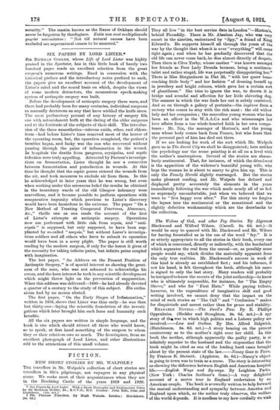FICTION.
travellers in life's pilgrimage, not voyagers in any physical sense. We make most of their acquaintances when they are in the Doubting Castle of the years 1919 and 1920:
• Six Papers by Lord Lister. With a Short Biography and Explanatory Notes by Sir Rickman Godlee, Bt., R.C.V.O., M.S. London : John Bale, Sons, and Danielsson. 1103. net.]
t The Thirteen Travellers. DI Hugh Welecde. London Hutchinson. 6d.1 They all live ." in the best service flats inLondon"—HortoWs, behind Piccadilly. There is. Mr. Absalom Jay, who was very, smart in the nineties, caricatured by "Spy," a friend of King Edward's. He supports himself all through the years. of the war by the thought that when it is over " everything" will come right again ; and when he has gradually discovered that the old life can never come back, he dies almost directly of despair. Then there is Clive Torby, whose mother " was known amongst her friends as Poor Lady Dronda because, being a. sentimen- talist and rather stupid, life was perpetually disappointing her." There is Miss Morganhurst in Flat 30, " with her queer bone. cracking little body " and her fashion " of dressing herself up in jewellery and bright colours, which gave her a certain sort of ghastliness." She tries to ignore the war, to drown it in bridge and scandal and affection for her little shivering dog. The manner in which the war finds her out is subtly contrived. And so on through a gallery of portraits—the ingenue from a rectory who comes to stay with the rich aunt : the old widow lady and her companion ; the masculine young woman who has been an officer in the W.A.A.C.s and who mismanages her love affairs from a too whole-hearted faith in her own compe- tence : Mr. Nix, the manager of Horton's, and the young man whose body comes back from France, but who fears that the personal part of him has died out there.
If we are looking for work of the sort which Mr. Walpole gave us in The Secret Citywe shall be disappointed; here neither the psychology nor the scene painting is at all on a level with the author's masterpieces. Several of the stories are shame- lessly sentimental. That, for instance, of which the denoiimeni is the apparition of the widower's beautiful young wife, who begs the woman he is about to marry to give him up. This is only the Family Herald slightly rearranged. But the stories make pleasant reading, and Mr. Walpole has defined and displayed pretty accurately the elements in the years immediately following the war which made nearly all of us feel so supremely uncomfortable, just when we believed that we were to " live happy ever after." For this nicety we forgive the lapses into the sentimental or the sensational and the slightly defective workmanship which are the drawbacks to the collection.


































 Previous page
Previous page